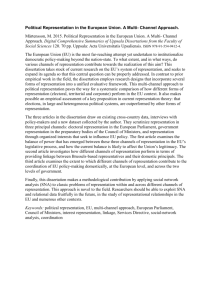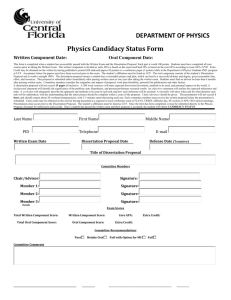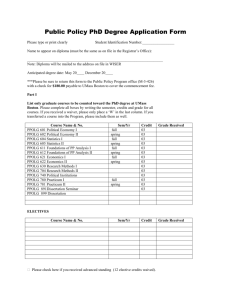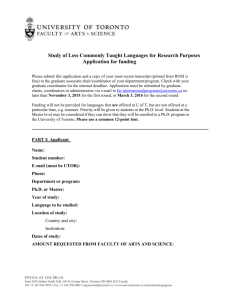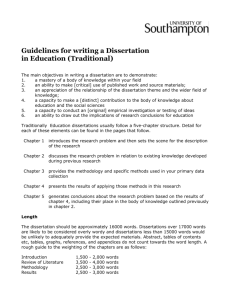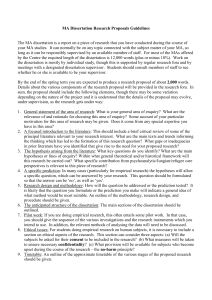"The Genesis of a Dissertation: From Choosing a Topic to
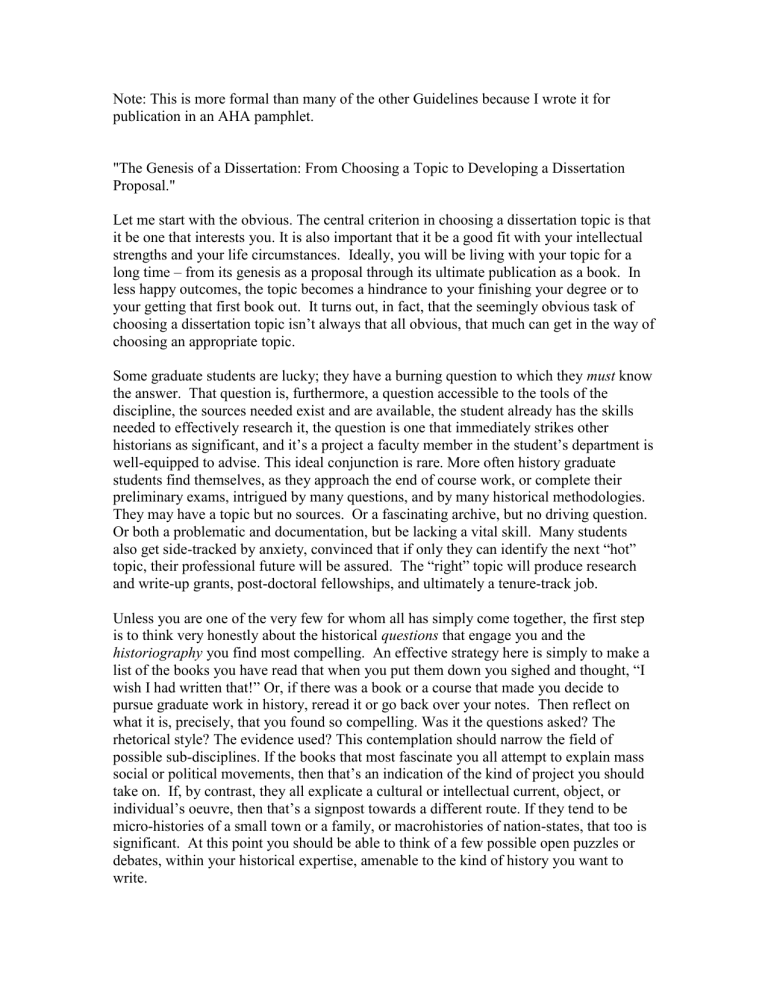
Note: This is more formal than many of the other Guidelines because I wrote it for publication in an AHA pamphlet.
"The Genesis of a Dissertation: From Choosing a Topic to Developing a Dissertation
Proposal."
Let me start with the obvious. The central criterion in choosing a dissertation topic is that it be one that interests you. It is also important that it be a good fit with your intellectual strengths and your life circumstances. Ideally, you will be living with your topic for a long time – from its genesis as a proposal through its ultimate publication as a book. In less happy outcomes, the topic becomes a hindrance to your finishing your degree or to your getting that first book out. It turns out, in fact, that the seemingly obvious task of choosing a dissertation topic isn’t always that all obvious, that much can get in the way of choosing an appropriate topic.
Some graduate students are lucky; they have a burning question to which they must know the answer. That question is, furthermore, a question accessible to the tools of the discipline, the sources needed exist and are available, the student already has the skills needed to effectively research it, the question is one that immediately strikes other historians as significant, and it’s a project a faculty member in the student’s department is well-equipped to advise. This ideal conjunction is rare. More often history graduate students find themselves, as they approach the end of course work, or complete their preliminary exams, intrigued by many questions, and by many historical methodologies.
They may have a topic but no sources. Or a fascinating archive, but no driving question.
Or both a problematic and documentation, but be lacking a vital skill. Many students also get side-tracked by anxiety, convinced that if only they can identify the next “hot” topic, their professional future will be assured. The “right” topic will produce research and write-up grants, post-doctoral fellowships, and ultimately a tenure-track job.
Unless you are one of the very few for whom all has simply come together, the first step is to think very honestly about the historical questions that engage you and the historiography you find most compelling. An effective strategy here is simply to make a list of the books you have read that when you put them down you sighed and thought, “I wish I had written that!” Or, if there was a book or a course that made you decide to pursue graduate work in history, reread it or go back over your notes. Then reflect on what it is, precisely, that you found so compelling. Was it the questions asked? The rhetorical style? The evidence used? This contemplation should narrow the field of possible sub-disciplines. If the books that most fascinate you all attempt to explain mass social or political movements, then that’s an indication of the kind of project you should take on. If, by contrast, they all explicate a cultural or intellectual current, object, or individual’s oeuvre, then that’s a signpost towards a different route. If they tend to be micro-histories of a small town or a family, or macrohistories of nation-states, that too is significant. At this point you should be able to think of a few possible open puzzles or debates, within your historical expertise, amenable to the kind of history you want to write.
The second step is to evaluate the kind of historical research for which you have the necessary skills and that you enjoy doing. Some kinds of projects will have you largely sitting in libraries reading perfectly legible printed books. Some will have you in archives opening mysterious carton after mysterious carton, spending minutes if not hours simply figuring out what the stuff is, before trying to read it. Actually reading it may pose its own challenges of handwriting, language use, and fragmentariness. Many projects fall in between, requiring some library and some archival work. Other dissertations force you to “make” your own archive, that you persuade individuals, families, organizations, or businesses to let you look at their private traces. Some require taking seemingly trivial, ephemeral materials – telephone books, restaurant menus, knitting patterns – and constructing a narrative of them. Some provide an opportunity for you to talk with people, to do oral histories. Some require skills in other disciplines – art or architectural history, statistics, cartography, musicology or archeology. Some will demand that you learn languages you don’t yet know. Some will require several years of residence abroad; some will keep you moving from one town to another, following an archival trail; some can be done from your university library. It is essential to look at your own intellectual and craft-skill strengths and weaknesses honestly. Some limitations or gaps can be effectively addressed, but some should be lived with, and a topic chosen that accommodates them.
In addition to one’s intellectual talents, skills, and tastes, one’s life circumstances matter.
Being attached or single, without kids or with, gay, straight, trans-sexual, or bi, Asian-
American, black, latino, or white, religiously observant or not, all shape what is actually practicable and what is not. Seek advice on these questions, and not only from your official advisor. Not all faculty or fellow students know what it’s like to live a particular place as a woman, or what childcare facilities are likely to exist, or how comfortable it is to be black, or lesbian. Those are all legitimate and necessary considerations in the choice of a dissertation topic.
Unfortunately, the question of what kind of history one wants to write, and what kind of history one is best suited or able to write, are not the same. A few examples may clarify this point. One may very much enjoy reading social histories, books that grapple with how life was lived, experienced, interpreted by marginally literate, or illiterate people, but not in fact have the great patience, good imagination for possible sources, tolerance for reading texts that are not intrinsically interesting, willingness to spend a long time in the field, and auxiliary skills in other disciplines, required. One may find the books one can write on the basis of quantitative analyses of production and consumption fascinating, but have no talent for the statistics and the construction of data bases essential to this approach. One may be unable to put down monographs that parse and explain a corpus of complex philosophical arguments, but not have the excellent skills in the close reading of texts, and broad and deep knowledge of the cultural milieu in which those texts were produced necessitated by intellectual history.
After you have made your initial lists – of the books you would have liked to have written; of the historical questions that move you; of your intellectual tastes and
proclivities; of the possibilities and constraints of your life circumstances – you should be ready to write up a final, short, list of possible topics. At this point, in addition to brainstorming with colleagues and teachers, you should turn your attention seriously to the existing historiography and source possibilities. What has been written on, or related to, this topic? If it’s an area in which no one seems to have written for a long time, why is that? If a great deal has been produced in the last ten years, is there really room for you?
What kinds of sources might there be? Where are they? What new skills do you need to learn? Do you really want to do so? Do not try to decide what the marketable topic in four years will be; we are historians not fortune tellers. From your short-list, again ideally in consultation, make a decision.
Particularly if there is any question of the fit between the topic one wants to do and its feasibility (both in general and for you in particular) it is extremely helpful to find a grant that enables you do a couple of months of pre-dissertation research. These short research trips enable you to discover before you are completely committed to a topic whether or not it’s a good topic – in all of the senses discussed above – for you. The work they enable will also facilitate writing effective dissertation proposals and grant applications.
By the time you are at the point of applying for pre-dissertation grants, however, you will have had to choose your dissertation advisor and perhaps your committee. Both of these choices may be very obvious; there may be only one faculty member whose field specialization makes it appropriate for her or him to chair your committee and the same may be true of the other members of the committee. Often, however, there is a choice, in which case some useful questions to ask yourself concerning the choice of major advisor are: Is the professor someone with whom you find it helpful and easy to brainstorm?
Have you found the feedback on earlier work with that faculty member helpful? Is her or his intellectual and professional approach one you find compatible? Your relationship with your thesis advisor will, hopefully, continue for many years. S/he will see you through graduate school, into your first (and sometimes subsequent jobs), provide advice about publishing your first book, and write recommendations for you for a very long time. You should not, therefore, choose a thesis advisor on the basis of who is on leave, or not, in a given year. Second, third and fourth readers should be selected together to compose a complementary dissertation committee. They are often chosen to provide thematic or methodological expertise. Or they may be faculty with whom you have a good brainstorming relationship, or who you find to be particularly good readers. There is no one model for a successful relationship between students and their dissertation committees, but good communication and shared expectations obviously help a great deal.
Once you have assembled your dissertation committee, most history departments require some form of proposal. The proposal has three purposes: 1) To provide you with a map of your project for the next couple of years. It is very easy, even necessary, to lose sight of the big picture as you work your way through the sources. It is crucial, therefore, to have a clear statement of the larger goals – the main theme, the key questions, and the fields of study -- to which you can refer after a few months of archival dust. Needless to say, this picture changes over time as you work on your thesis. 2) To allow your
committee to provide the best possible assistance to you in moving the dissertation from a dream to a reality. Your committee can only be useful if it really understands the project.
3) To have a text to show other scholars over the next few years, that will give them a clear sense of what you’re doing. Dissertation proposals should be detailed enough to provide a clear map of the questions being asked and their significance, the relevant historiography, the conceptual framework, the sources as known, and your research strategy. It does not need to be a book in itself and should not attempt the impossible of stating the conclusions of research not yet done.
Dissertations are professional credentials. Much more significantly, however, researching and writing a dissertation is a magnificent adventure. The best dissertations, and the ones that earn people the best jobs, are not the ones that “fill a gap” nor the ones thought to be the next “hot topic,” but rather the ones their authors were driven to write.




